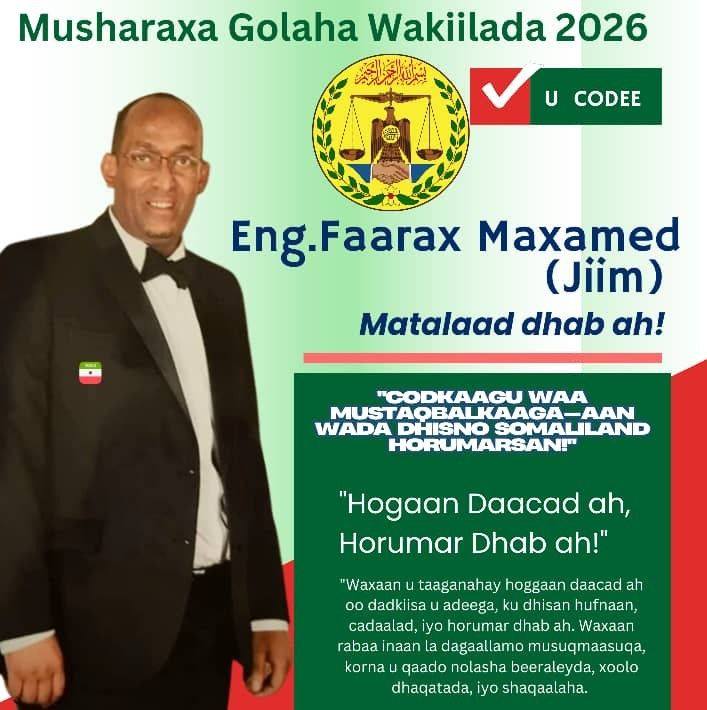 hadhwanaagnews
hadhwanaagnews
Somaliland at a Crossroads: Rethinking Elections, Representation & Recognition
For over three decades, Somaliland has defied the odds—building peace, holding elections, and governing itself in a volatile region. Yet, we must now admit an uncomfortable truth: our current electoral framework is fractured, out of sync, and increasingly out of step with the promise of the democratic future we aspire to.
As we celebrate democratic gains, we must also confront the unresolved crisis: a misaligned electoral cycle that’s led to costly delays, mistrust, and legitimacy gaps between our institutions. Parliament and local councils are due to expire in 2026, while the House of Elders (Guurti) sits extended until 2027—despite never undergoing a democratic renewal since 1993. Meanwhile, the Presidency is valid until 2029 after a historic and peaceful election in 2024.
So how do we move forward responsibly, credibly, and in a way that inspires our people and strengthens our case for international recognition?
???? The Misalignment Dilemma
Institution Next Scheduled Election Status
President November 2029 Constitutionally valid
Parliament & Councils May 2026 Due soon
House of Elders November 2027 Legitimacy questioned (extended)
This fragmented timeline not only drains resources—it erodes public trust and weakens institutional authority. Each staggered election becomes a flashpoint for division and delay.
???? A National Realignment Opportunity
Could we responsibly extend the terms of Parliament and Local Councils by 18 months—to align with the Guurti’s timeline in November 2027? Not to entrench power, but to reset the system once and for all.
This would give us:
????️ One unified legislative election in November 2027
???? Time to pass key reforms: Guurti law, NEC overhaul, electoral act update
???? Less political tension, fewer election costs, and a more informed electorate
???? A restored sense of order, legitimacy, and national direction
The Presidency remains untouched—preserving constitutional balance and giving the current administration, under H.E. President Abdirahman Mohamed Abdullahi (Cirro), space to deliver reforms.
???????? What We Can Learn from Kenya: A Decentralization Model
Kenya faced similar fragmentation and mistrust. In 2010, it adopted a new constitution that ushered in a decentralized system:
Elected County Governors & Assemblies
Direct election of Senators & Women’s Representatives
Independent commissions with reduced presidential interference
This structure didn’t just redistribute power—it rekindled accountability, service delivery, and local pride.
Imagine this adapted for Somaliland by 2027:
Democratically elected Regional Councils & Mayors
Locally accountable Police Commissioners & Governors
Expanded, directly elected parliament with zonal representation
???? Is This Affordable?
Decentralization isn’t free—but it’s feasible. Kenya spent ~$250 million setting up its 47 counties. For Somaliland, with 6 regions and fewer administrative layers, a phased decentralization could be launched with less than $20–30 million over five years.
Meanwhile, holding one synchronized election (instead of 3 separate ones) could save Somaliland an estimated $5–7 million per electoral cycle—enough to cover electoral infrastructure, reform, and public education.
???? How It Strengthens Our Call for Recognition
Recognition isn’t just about history—it’s about credibility, functionality, and the perception of legitimacy.
Unified elections project political maturity
Decentralized governance shows institutional strength
Clear reforms restore international trust in our systems
This isn’t just internal housekeeping. It’s an opportunity to stand before the world in 2027 with:
✅ Aligned legislative institutions ✅ Reformed electoral laws ✅Accountable local governments ✅ Peaceful transitions without extensions
It tells our people—and our partners: Somaliland is ready.
???? A Moment for Reflection, Not Imposition
This proposal isn’t about dictating terms or extending power. Waa feker la isku raaci karo—waana dariiq laga fogaan karo qalalaase siyaasadeed oo kale.
Let’s consult broadly, legislate transparently, and communicate clearly. We must trust our institutions to agree on a limited, consensus-based term extension—not as an end, but as a means to reset.
As one of many citizens preparing to run in the upcoming elections, my duty is to think boldly and inclusively.
???? Summary of the Proposal:
???? Extend Parliament & Local Councils by 18 months to November 2027 ????Conduct synchronized legislative elections: MPs, Councils, Guurti ????Maintain presidential term (expires Nov 2029) ???? Pass critical reforms before May 2026 ???? Lay legal groundwork for phased decentralization by 2027
Let’s build a democratic system worthy of our sacrifices, our people, and our rightful place in the world.
By Eng. Faarax Maxamed (Jiim)
Farah Abdi <[email protected]>
https://www.facebook.com/share/1FuHKkDHgp/
Much Appreciated
Hadhwanaagnews marnaba masuul kama aha Aragtida dadka kale. Qoraaga ayaa xumaanteeda, xushmadeeda iyo xilkeeda sida. waxa kaliya oo Hadhwanaagmedia dhiirigalinaysaa, isdhaafsiga aragtida, canaanta gacaliyo talo wadaagga!